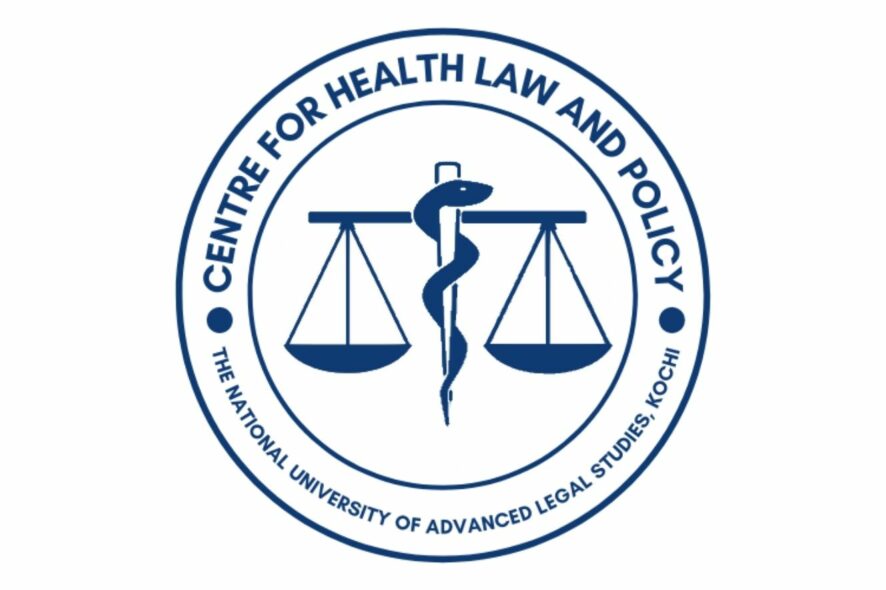The Centre for Health Law and Policy (CHLP) at The National University of Advanced Legal Studies (NUALS), Kochi is inviting chapters in the form of Articles, Short Notes, Book Reviews Case/Report Commentaries and other such for its flagship book on Healthcare, Technology and the Law: Interplay between Regulations and Digital Healthcare. The book will entail a multidisciplinary discussion and approach towards digital healthcare and law.
The Centre for Health Law and Policy is an interdisciplinary Centre established on 8th Aug 2014 at National University of Advanced Legal Studies. The Centre was inaugurated by the Hon’ble minister for Education of Kerala Mr. Abdu Rabb. The Centre aims to encourage, promote and support innovative and important scholarship including teaching, research, consultancy and advocacy in areas of health care law.
About the Theme of the Book
“Healthcare Technologies and Law”
When it comes to digital health, productivity and personalised treatment for patients have been characterised because of the use of digital technology in healthcare.
Among the rapidly innovative technologies in the Indian digital health sector are telemedicine, mobile health, health and wellness applications, medical imaging, big data and the Internet of Medical Things (IoMT); robot-assisted surgery; self-monitoring medical devices; electronic health records (EHR); healthcare service aggregation; targeted advertising; personal genomics and individualised medicine; e-pharmacies; cloud computing; cloud computing services (AI).
It is imperative that personal data be protected because of the frequent flow of information and personal data between service providers and patients on health issues and advice. For this, the Information Technology Act of 2000, the Data Protection Rules of 2011 and the Intermediaries Guidelines of 2011 have been made accessible. Despite this, however, no standards have yet been established to require the application of data protection and security measures. Bill 2019 for the Protection of Personal Data was first tabled in Lok Sabha on December 11th, 2019. The proposed legislation aims to safeguard the privacy of individuals’ personal data by creating a Data Protection Authority. Strict adherence to regulations pertaining to the safety, privacy, and confidentiality of patient health information is essential.
Moreover, more recently the Central Government itself has taken a step to digitise healthcare which has provided space for extended discussion. India’s Ayushman Bharat Digital Mission (ABDM) was inaugurated on September 27 with the goal of creating a “inclusive and holistic” model of health care for all citizens. Accessing and linking personal information with a unique ID to construct a long-term health history are among the goals of this project. The blueprint says that it aims to develop an ecosystem of linked databases of patients, health records, and hospitals based on the concepts of unique IDs, privacy by design, interoperable data, and open standards.
It is important for enforcement to consider privacy and infringement issues while analysing and interpreting data for market research, marketing, and regulatory exchanges. The protection of one’s personal data is of paramount importance while it is being used and implemented. The primary contractual consideration is to enter non-disclosure and confidentiality contracts with employees and other influencers participants in the investigation and provide solutions due to violation of pre-defined contractual terms to ensure confidentiality and privacy at various stages from data collection to use.
Moreover, healthcare technologies are brought under the legislations governing intellectual property since, the medical equipment and various drug formulas require patent protection. The introduction and utilisation of AI and assisted tools in medicine, bring the algorithms and software under the purview of copyright protection.
The growing influence and importance of social networking sites poses as a negative influence on the mental health of impressionable individuals. Wherein on one extreme social media usage impacts the mental health of individuals detrimentally, the same is being utilised to drive digital health care programs and initiatives. The intricacies of the attribution of liability of social media and related technologies on the mental and general health of individuals can be explored. The authors are motivated to take a multidisciplinary or specialised approach towards the topic.
Disclaimer – Copyright over the submission, once accepted and published, would lie with The National University of Advanced Legal Studies, Kochi.
Submission Guidelines
- Categories
- Articles of length: 3000-5000 words (exclusive of footnotes; however, speaking footnotes must be limited to 50 words); articles exceeding the word limit may be considered on merit.
-
- Short Notes (between 1500 and 5000 words)
- Book Reviews/Case Comments (minimum of 1500 words)
- Longer submissions may be considered based on merit.
- Submissions are to be made only in electronic form and must be sent only through the attached Google form HERE . Please note that any submissions made through mail will not be considered.
- The last date for submissions is January 15, 2022.
- By submitting an article, the author undertakes that the article is an original work and has not been submitted, accepted, or published elsewhere.
- Plagiarism will result in summary rejection of the submission. Plagiarism limit- 15%.
- Co-authorship is allowed for a maximum of two authors.
- Formatting Guidelines
- All submissions must follow the Bluebook (20th Edition) style of citation; non-conformity will be a ground for rejection.
- Submissions must be in Times New Roman font, with size 12 and line spacing 1.5.
- All footnotes must be in Times New Roman font, with size 10 and line spacing 1.
- Submissions must be made in .doc/.docx formats only.
- The documents must not contain any identification markers. Eg: Name of the author after the title, Author as recognized by Word, or any other metadata.
- Receipt of submission will be intimated to the authors within two weeks of submission.
- For clarifications contact us at chlp@nuals.ac.in or Naveen Kumar (9742576738).






